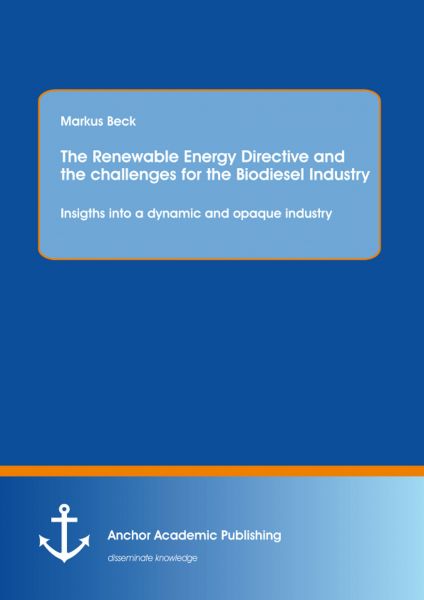The Renewable Energy Directive and the challenges for the Biodiesel Industry: Insigths into a dynami
In response to climate change, and unsustainable energy consumption, the European Parliament launched a climate and energy package in 2009. This included the 20:20:20 Energy Strategy whose aim was to decrease the effects of climate change, in particular by lowering greenhouse gas (GHG) emissions by 2020. This 10-year action plan proposes measures to increase the current efficiency levels of energy use, and raises the share of renewable energies within the energy mix for all 27 EU Member States. As a result, the increased use of biofuels, particularly in the transport sector, will be an important part of a more complex framework. Although, biofuels represent only two per cent of total transport fuels used, political incentives, technology, and efficiency improvements could increase this by eight per cent in Europe by 2020.
In line with the 20:20:20 Strategy, the Renewable Energy Directive (RED) was introduced to regulate the overall biofuel market, amongst others. Based on the RED’s definition of sustainability, different certification schemes emerged, aimed at creating a uniform biofuel standard within Europe. At present, the overall scale and scope of environmental and social impacts associated with the biofuel supply chain are not well defined, and this will be evaluated within this work. Furthermore, close ties between the biofuel supply chain, and other sectors, including food and crude oil industries lead to associations with issues such as deforestation, pollution and food supply shortages. Thus, this book will analyse whether RED actually supports such a low-carbon pathway or it mainly supports the local industry.
Text Sample:
Chapter 3.3, Feedstock production, crushing plant and oil production:
The quantity of oilseeds, which crushing plants are able to process, highly depends on the type of seeds as well as the facility itself. In particular in Argentina where the crushing industry is mostly export oriented, the crushing capacity reaches up to 6,000 to 10,000 tons of soybeans per day. Moreover in Germany there are huge discrepancies between enormous industrial plants on strategic places like the ADM crushing plant in Hamburg that is specialized on feedstock imported from overseas and has a six kmt per day capacity, while smaller family owned crushing plants in the south cannot compete regarding volume with these big ones. These have far smaller capacities, between 30 and 300 tons per day and are flexible in terms of feedstock. In general, most of the crushing plants in Europe are capable to produce multiple feedstocks given that the seed-to-oil conversion ratio ranges between 0.19 tons of oil per ton of beans (soybeans) and 0.44 mt of oil per metric ton (mt) of seeds (SFS). Nevertheless, the proportion of various oilseeds in terms of capacity utilization is hard to track as the industry is quite fragmented and non-transparent. The big players and integrated supply chain manager operating large crushing plants will run the crushing plants non-stop as the fixed costs are very high and the margins are generally low so that the high volume provides the satisfying economic result. In contrast to soybeans, rape and sun seed, palm oil can only be transported as oil and has to be crushed immediately so that the two major producing areas, Indonesia and Malaysia export the liquid oil in huge volumes. There is an elevated potential for palm oil as biodiesel feedstock due to a comparatively high yield per hectare. Furthermore, the rapeseed is the most prevalent feedstock for biodiesel production in Europe, it has the largest stake in the crushing with over 21 mmt of RSS, twelve mmt of SB and around seven mmt of SFS were crushed in 2011.
As part of most of the crushing plants, an oil extraction refinery facility produces edible oil for food and industrial purpose as well as feedstock for biodiesel production. Refined vegetable oils provide the best raw material to produce biodiesel since the conversion ratio of pure triglyceride into fatty acid methyl ester (FAME) is elevated and reaction time is comparatively short. Nevertheless, waste or used cooking oil (UCO) can also be suitable for biodiesel production, particularly when it is properly collected in terms of GHG emissions of collection logistics. However, UCO requires a pre-treatment before it can be used as feedstock which includes filtering and heating processes.
Markus Beck was born in 1985 in Karlsruhe. After finishing high School, he spent one year teaching in a primary school in Peru before he started a double degree in International Management in Madrid (Universidad Pontifica Comillas and ESB Reutlingen). Markus graduated with a German and Spanish Master in International Management (Diplombetriebswirt and Graduado Superior de Ciencias Empresariales), earned additional credits in the USA (Harvard University) and got first work experiences in Management Consulting (Capgemini), Investment Banking (Rothschild) and within a Global Consumer Good Company (Procter and Gamble). In 2010, Markus joint a double degree program in Sustainable development and spend one year in Paris (HEC) and one in Sao Paulo (Fundacao Getulio Vargas) where he also commenced working as a commodity for a Global Supply Chain Manager (Noble Group). His passion for macroeconomics and sustainability as well as interest for global trade flows and natural resources motivated him to deeply dive into the topic of this book.
Versandkostenfreie Lieferung! (eBook-Download)
Als Sofort-Download verfügbar
- Artikel-Nr.: SW9783954895656
- Artikelnummer SW9783954895656
-
Autor
Markus Beck
- Wasserzeichen ja
- Verlag Anchor Academic Publishing
- Seitenzahl 128
- Veröffentlichung 01.06.2013
- ISBN 9783954895656

